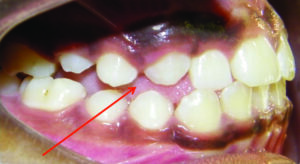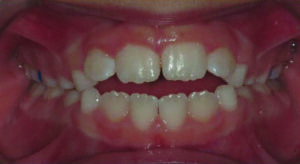The proverb states, “The tongue can be your biggest enemy.” That is to say, you said something you did not mean. But literally speaking, the tongue does cause us a lot of problems. That’s what Dr. Razdolsky and Elizabeth were reminded of at the American Association of Orthodontics Midwinter meeting on treatment of open bite cases held in Austin, Texas earlier this month.
The tongue is a very powerful muscle – one that’s strong enough to push teeth out of their natural position. So, together with hundreds of other orthodontists from all over the world Yan and Elizabeth learned to identify the etiological factors for anterior open bites through analyzing different tongue positions at rest. The program titled, All About Open Bites, further focused on the diagnosis and treatment options for today’s orthodontist.
“The tongue applies nearly four pounds of pressure every time we swallow. This pressure, when accompanied by a bad swallowing habit can be disastrous to tooth alignment,” said Dr. Yan Razdolsky. “To make matters worse, the average person swallows nearly 2,000 times per day! This makes tongue thrust a big factor in the treatment and re-treatment of open bite or malocclusion,” he added.
Tongue thrust is described as the habit of pushing the tongue forward between the upper and lower teeth when swallowing, rather than the proper position against the gum and above the upper front teeth. Over time, tongue thrusting can lead to an open bite where only the back teeth will come together during a bite – the front teeth don’t actually touch. A lateral open bite is when teeth do not meet on the sides. It is the anterior open bite, however, that is considered one of the malocclusions most difficult to correct.
So, what is the treatment for tongue thrust? Treatment can include therapeutic exercises to re-train the tongue, kind of like physical therapy. In some cases, Dr. Razdolsky may also prescribe a dental appliance to aid in correction.
“Other various oral habits such as thumb or finger sucking, finger biting, lip biting or sucking, bruxism and even mouth breathing can further produce destructive effects on the dentoalveolar structures,” said Dr. Razdolsky. “All these habits will affect muscle and skeletal growth and can lead to permanent orthodontic issues in adulthood if they are not detected and treated before the completion of facial growth and development.”
Not to worry though… through conferences like the one discussed here, Dr. Razdolsky, Elizabeth and the entire Forever Smiles team stay up to date on the latest treatment options so when your braces do come off, your teeth will stay in alignment.





